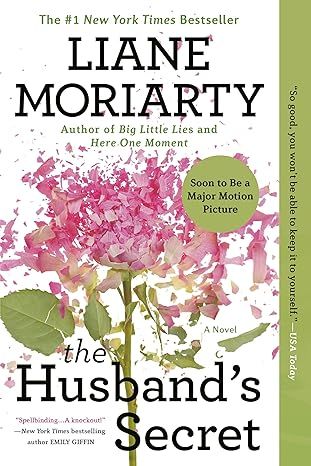The Husband's Secret
4.2
-
141,627 ratings
SOON TO BE A MAJOR MOTION PICTURE—THE #1 NEW YORK TIMES BESTSELLER FROM THE AUTHOR OF BIG LITTLE LIES AND HERE ONE MOMENT
At the heart of The Husband’s Secret is a letter that’s not meant to be read…
My darling Cecilia,
If you’re reading this, then I’ve died… Imagine your husband wrote you a letter, to be opened after his death. Imagine, too, that the letter contains his deepest, darkest secret—something with the potential to destroy not only the life you built together, but the lives of others as well. And then imagine that you stumble across that letter while your husband is still very much alive... Cecilia Fitzpatrick has achieved it all—she’s an incredibly successful businesswoman, a pillar of her small community, and a devoted wife and mother. But that letter is about to change everything—and not just for her. There are other women who barely know Cecilia—or each other—but they, too, are about to feel the earth-shattering repercussions of her husband’s secret. READERS GUIDE INCLUDED
Kindle
$12.99
Available instantly
Audiobook
$0.00
with membership trial
Hardcover
$34.99
Paperback
$10.94
Ships from
Amazon.com
Payment
Secure transaction
ISBN-10
0425267725
ISBN-13
978-0425267721
Print length
464 pages
Language
English
Publisher
Berkley
Publication date
March 02, 2015
Dimensions
5.44 x 0.97 x 8.22 inches
Item weight
1 pounds
Popular highlights in this book
Marriage was a form of insanity; love hovering permanently on the edge of aggravation.
Highlighted by 9,376 Kindle readers
Falling in love was easy. Anyone could fall. It was holding on that was tricky.
Highlighted by 7,520 Kindle readers
Perhaps nothing was ever meant to be. There was just life, and right now, and doing your best. Being a bit bendy.
Highlighted by 3,213 Kindle readers
Product details
ASIN :
B00D7Z4GQY
File size :
2742 KB
Text-to-speech :
Enabled
Screen reader :
Supported
Enhanced typesetting :
Enabled
X-Ray :
Not Enabled
Word wise :
Enabled
Editorial reviews
Amazon.com Review
An Amazon Best Book of the Month, August 2013: Liane Moriary is probably doomed to be forever labeled a writer of “chick lit.” But despite its dopey name, her new novel, The Husband’s Secret, is better described as a comedy of manners and one with a serious undertone. As in her previous books, most successfully What Alice Forgot, Moriarty here wittily and observantly chronicles the life of middle aged, middle class Australian women, suburbanites who grapple with prosaic issues like marital fidelity and torturous ones like moral guilt and responsibility. You can’t help but laugh along with the small observations--“And there was poor little Rob, a teenage boy clumsily trying to make everything right, all false smiles and cheery lies. No wonder he became a real estate agent.” But it’s the big ones--Can good people do very, very bad things, and what, exactly, are we responsible for, and for how long?--that will make you think. This is a deceptively rich novel that transcends its era and place at the same time that it celebrates same. --Sara Nelson
From Publishers Weekly
Australian author Moriarty, in her fifth novel (after The Hypnotist's Love Story), puts three women in an impossible situation and doesn't cut them any slack. Cecilia Fitzpatrick lives to be perfect: a perfect marriage, three perfect daughters, and a perfectly organized life. Then she finds a letter from her husband, John-Paul, to be opened only in the event of his death. She opens it anyway, and everything she believed is thrown into doubt. Meanwhile, Tess O'Leary's husband, Will, and her cousin and best friend, Felicity, confess they've fallen in love, so Tess takes her young son, Liam, and goes to Sydney to live with her mother. There she meets up with an old boyfriend, Connor Whitby, while enrolling Liam in St. Angela's Primary School, where Cecilia is the star mother. Rachel Crowley, the school secretary, believes that Connor, St. Angela's PE teacher, is the man who, nearly three decades before, got away with murdering her daughter—a daughter for whom she is still grieving. Simultaneously a page-turner and a book one has to put down occasionally to think about and absorb, Moriarty's novel challenges the reader as well as her characters, but in the best possible way. Agent: Faye Bender, Faye Bender Literary Agency. (Aug.)
Review
Praise for The Husband's Secret
One of the Best Books of the Year—Entertainment Weekly
One of the Top Ten Books of the Year—People
“Spellbinding...A knockout!”—Emily Giffin, New York Times bestselling author
“The Husband’s Secret is so good, you won’t be able to keep it to yourself.”—USA Today
“What a wonderful writer—smart, wise, funny.”—Anne Lamott, New York Times bestselling author
“Brilliant.”—Sophie Hannah, New York Times bestselling author
“Lip-smacking and sharply intelligent.”—Entertainment Weekly
“Perfect for vacation reading: There’s humor, suspense, a circle of appealing women.”—People
“Secrets can be sinister; they can eat you alive. But they can also set you free. The Husband’s Secret demonstrates this power with one of the most entertaining stories I have read in ages. Perfect for book clubs—lots to debate in these pages. I just loved it.”—Dorothea Benton Frank, New York Times bestselling author
“Simultaneously a page-turner and a book one has to put down occasionally to think about and absorb, Moriarty’s novel challenges the reader as well as her characters, but in the best possible way.”—Publishers Weekly
“Reading groups rejoice. This meaty novel from the bestselling author will probably land on many must-read lists.”—Fort Worth Star-Telegram
“Moriarty may be an edgier, more provocative, and bolder successor to Maeve Binchy.”—Kirkus Reviews (starred review)
About the Author
Liane Moriarty is the #1 New York Times bestselling author of Nine Perfect Strangers, Three Wishes, Truly Madly Guilty, Big Little Lies, The Husband’s Secret, The Hypnotist’s Love Story, and What Alice Forgot. She lives in Sydney, Australia, with her husband and two children.
Read more
Sample
Poor, poor Pandora. Zeus sends her off to marry Epimetheus, a not especially bright man she’s never even met, along with a mysterious covered jar. Nobody tells Pandora a word about the jar. Nobody tells her not to open the jar. Naturally, she opens the jar. What else has she got to do? How was she to know that all those dreadful ills would go whooshing out to plague mankind forevermore, and that the only thing left in the jar would be hope? Why wasn’t there a warning label? And then everyone’s like, Oh, Pandora. Where’s your willpower? You were told not to open that box, you snoopy girl, you typical woman with your insatiable curiosity; now look what you’ve gone and done. When for one thing it was a jar, not a box, and for another—how many times does she have to say it?—nobody said a word about not opening it!
ONE
MONDAY
It was all because of the Berlin Wall.
If it weren’t for the Berlin Wall, Cecilia would never have found the letter, and then she wouldn’t be sitting here, at the kitchen table, willing herself not to rip it open.
The envelope was gray with a fine layer of dust. The words on the front were written in a scratchy blue ballpoint pen, the handwriting as familiar as her own. She turned it over. It was sealed with a yellowing piece of sticky tape. When was it written? It felt old, like it was written years ago, but there was no way of knowing for sure.
She wasn’t going to open it. It was absolutely clear that she should not open it. She was the most decisive person she knew, and she’d already decided not to open the letter, so there was nothing more to think about.
Although, honestly, if she did open it, what would be the big deal? Any woman would open it like a shot. She listed all her friends and what their responses would be if she were to ring them up right now and ask what they thought.
Miriam Oppenheimer: Yup. Open it.
Erica Edgecliff: Are you kidding, open it right this second.
Laura Marks: Yes, you should open it and then you should read it out loud to me.
Sarah Sacks: . . .
There would be no point asking Sarah because she was incapable of making a decision. If Cecilia asked her if she wanted tea or coffee, she would sit for a full minute, her forehead furrowed as she agonized over the pros and cons of each beverage, before finally saying, “Coffee! No, wait, tea!” A decision like this one would give her a seizure.
Mahalia Ramachandran: Absolutely not. It would be completely disrespectful to your husband. You must not open it.
Mahalia could be a little too sure of herself at times with those huge brown ethical eyes.
Cecilia left the letter sitting on the kitchen table and went to put the kettle on.
Damn that Berlin Wall, and that Cold War, and whoever it was who sat there back in nineteen forty-whenever-it-was, mulling over the problem of what to do with those ungrateful Germans; the guy who suddenly clicked his fingers and said, “Got it, by Jove! We’ll build a great big bloody wall and keep the buggers in!”
Presumably he hadn’t sounded like a British sergeant major.
Esther would know who first came up with the idea for the Berlin Wall. Esther would probably be able to give her his date of birth. It would have been a man, of course. Only a man could come up with something so ruthless, so essentially stupid and yet brutally effective.
Was that sexist?
She filled the kettle, switched it on and cleaned the droplets of water in the sink with a paper towel so that it shone.
One of the mums from school, who had three sons almost exactly the same ages as Cecilia’s three daughters, had said that some remark Cecilia had made was “a teeny-weeny bit sexist,” just before they started the Fete Committee meeting last week. Cecilia couldn’t remember what she’d said, but she’d only been joking. Anyway, weren’t women allowed to be sexist for the next two thousand years or so, until they’d evened up the score?
Maybe she was sexist.
The kettle boiled. She swirled an Earl Grey tea bag and watched the curls of black spread through the water like ink. There were worse things to be than sexist. For example, you could be the sort of person who pinched your fingers together while using the word “teeny-weeny.”
She looked at her tea and sighed. A glass of wine would be nice right now, but she’d given up alcohol for Lent. Only six days to go. She had a bottle of expensive Shiraz ready to open on Easter Sunday, when thirty-five adults and twenty-three children were coming to lunch, so she’d need it. Although she was an old hand at entertaining. She hosted Easter, Mother’s Day, Father’s Day and Christmas. John-Paul had five younger brothers, all married with kids. So it was quite a crowd. Planning was the key. Meticulous planning.
She picked up her tea and took it over to the table. Why did she give up wine for Lent? Polly was more sensible. She had given up strawberry jam. Cecilia had never seen Polly show more than a passing interest in strawberry jam, although now, of course, she was always catching her standing at the open fridge, staring at it longingly. The power of denial.
“Esther!” she called out.
Esther was in the next room with her sisters watching The Biggest Loser while they shared a giant bag of salt-and-vinegar chips left over from the Australia Day barbecue months earlier. Cecilia did not know why her three slender daughters loved watching overweight people sweat and cry and starve. It didn’t appear to be teaching them healthier eating habits. She should go in and confiscate the bag of chips, except they’d all eaten salmon and steamed broccoli for dinner without complaint, and she didn’t have the strength for an argument.
She heard a voice from the television boom, “You get nothing for nothing!”
That wasn’t such a bad sentiment for her daughters to hear. No one knew it better than Cecilia! But still, she didn’t like the expressions of faint revulsion that flitted across their smooth young faces. She was always so vigilant about not making negative body-image comments in front of her daughters, although the same could not be said for her friends. Just the other day, Miriam Oppenheimer had said, loud enough for all their impressionable daughters to hear, “God, would you look at my stomach!” and squeezed her flesh between her fingertips as if it were something vile. Great, Miriam, as if our daughters don’t already get a million messages every day telling them to hate their bodies.
Actually, Miriam’s stomach was getting a little pudgy.
“Esther!” she called out again.
“What is it?” Esther called back, in a patient, put-upon voice that Cecilia suspected was an unconscious imitation of her own.
“Whose idea was it to build the Berlin Wall?”
“Well, they’re pretty sure it was Nikita Khrushchev’s!” Esther answered immediately, pronouncing the exotic-sounding name with great relish and her own peculiar interpretation of a Russian accent. “He was, like, the prime minister of Russia, except he was the premier. But it could have been—”
Her sisters responded instantly with their usual impeccable courtesy.
“Shut up, Esther!”
“Esther! I can’t hear the television!”
“Thank you, darling!” Cecilia sipped her tea and imagined herself going back through time and putting that Khrushchev in his place.
No, Mr. Khrushchev, you may not have a wall. It will not prove that communism works. It will not work out well at all. Now, look, I agree capitalism isn’t the be-all and end-all! Let me show you my last credit card bill. But you really need to put your thinking cap back on.
And then fifty-one years later, Cecilia wouldn’t have found this letter that was making her feel so . . . What was the word?
Unfocused. That was it.
She liked to feel focused. She was proud of her ability to focus. Her daily life was made up of a thousand tiny pieces—“Need coriander”; “Isabel’s haircut”; “Who will watch Polly at ballet on Tuesday while I take Esther to speech therapy?”—like one of those terrible giant jigsaws that Isabel used to spend hours doing. And yet Cecilia, who had no patience for puzzles, knew exactly where each tiny piece of her life belonged and where it needed to be slotted in next.
And okay, maybe the life Cecilia was leading wasn’t that unusual or impressive. She was a school mum and a part-time Tupperware consultant, not an actress or an actuary or a . . . poet living in Vermont. (Cecilia had recently discovered that Liz Brogan, a girl from high school, was now a prizewinning poet living in Vermont. Liz, who ate cheese-and-Vegemite sandwiches and was always losing her bus pass. It took all of Cecilia’s considerable strength of character not to find that annoying. Not that she wanted to write poetry. But still. You would have thought that if anyone was going to lead an ordinary life, it would have been Liz Brogan.) Of course, Cecilia had never aspired to anything other than ordinariness. Here I am, a typical suburban mum, she sometimes caught herself thinking, as if someone had accused her of holding herself out to be something else, something superior.
Other mothers talked about feeling overwhelmed, about the difficulties of focusing on one thing, and they were always saying, “How do you do it all, Cecilia?” and she didn’t know how to answer them. She didn’t actually understand what they found so difficult.
But now, for some reason, something to do with this silly letter, everything felt somehow at risk. It wasn’t logical.
Maybe it wasn’t anything to do with the letter. Maybe it was hormonal. She was “possibly perimenopausal,” according to Dr. McArthur. (“Oh, I am not!” Cecilia had said automatically, as if responding to a gentle, humorous insult.)
Perhaps this was a case of that vague anxiety she knew some women experienced. Other women. She’d always thought anxious people were cute. Dear little anxious people like Sarah Sacks. She wanted to pat their worry-filled heads.
Perhaps if she opened the letter and saw that it was nothing, she would get everything back in focus. She had things to do. Two baskets of laundry to fold. Three urgent phone calls to make. Gluten-free muffins to bake for the gluten-intolerant members of the School Website Project Group (i.e., Janine Davidson), which would be meeting tomorrow.
There were other things besides the letter that could be making her feel anxious.
The sex thing, for example. That was always at the back of her mind.
She frowned and ran her hands down the sides of her waist. Her oblique muscles, according to her Pilates teacher. Oh, look, the sex thing was nothing. It was not actually on her mind. She refused to let it be on her mind. It was of no consequence.
It was true, perhaps, that ever since that morning last year, she’d been aware of an underlying sense of fragility, a new understanding that a life of coriander and laundry could be stolen in an instant, that your ordinariness could vanish, and suddenly you’re a woman on your knees, your face lifted to the sky, and some women are running to help, but others are already averting their heads, with the words not articulated, but felt: Don’t let this touch me.
Cecilia saw it again for the thousandth time: little Spider-Man flying. She was one of the women who ran. Well, of course she was, throwing open her car door, even though she knew that nothing she did could make any difference. It wasn’t her school, her neighborhood, her parish. None of her children had ever played with the little Spider-Man. She’d never had coffee with the woman on her knees. She just happened to be stopped at the lights on the other side of the intersection when it happened. A little boy, probably about five, dressed in a red and blue full-body Spider-Man suit was waiting at the side of the road, holding his mother’s hand. It was Book Week. That’s why the little boy was dressed up. Cecilia was watching him, thinking, Mmmm, actually Spider-Man is not a character from a book, when for no reason that she could see, the little boy dropped his mother’s hand and stepped off the curb into the traffic. Cecilia screamed. She also, she remembered later, instinctively banged her fist on her horn.
If Cecilia had driven by just ten minutes later, or even five minutes later, she would have missed seeing it happen. The little boy’s death would have meant nothing more to her than another traffic detour. Now it was a memory that would probably cause her grandchildren to one day say, “Don’t hold my hand so tight, Grandma.”
Obviously there was no connection between little Spider-Man and this letter. He just came into her mind at strange times.
Cecilia flicked the letter across the table with her fingertip and picked up Esther’s library book: The Rise and Fall of the Berlin Wall.
So, the Berlin Wall. Wonderful.
The first she knew that the Berlin Wall was about to become a significant part of her life had been at breakfast this morning.
It had been just Cecilia and Esther sitting at the kitchen table. John-Paul was overseas, in Chicago until Friday, and Isabel and Polly were still in bed.
Cecilia didn’t normally sit down in the mornings. She generally ate her breakfast standing at the breakfast counter while she made lunches, checked her Tupperware orders on her iPad, unpacked the dishwasher, texted clients about their parties, whatever, but it was a rare opportunity to have some time alone with her odd, darling middle daughter, so she sat down with her Bircher muesli, while Esther powered her way through a bowl of rice bubbles, and waited.
She’d learned that with her daughters. Don’t say a word. Don’t ask a question. Give them enough time and they’ll finally tell you what’s on their minds. It was like fishing. It took silence and patience. (Or so she’d heard. Cecilia would rather hammer nails into her forehead than go fishing.)
Silence didn’t come naturally to her. Cecilia was a talker. “Seriously, do you ever shut the hell up?” an ex-boyfriend had said to her once. She talked a lot when she was nervous. That ex-boyfriend must have made her nervous. Although she also talked a lot when she was happy.
But she didn’t say anything that morning. She just ate, and waited, and sure enough, Esther started talking.
“Mum,” she said, in her husky, precise little voice with its faint lisp. “Did you know that some people escaped over the Berlin Wall in a hot-air balloon they made themselves?”
“I did not know that,” said Cecilia, although she might have known it.
So long, Titanic; hello, Berlin Wall, she thought.
She would have preferred it if Esther had shared something with her about how she was feeling at the moment, any worries she had about school, her friends, questions about sex. But no, she wanted to talk about the Berlin Wall.
Ever since Esther was three years old, she’d been developing these interests or, more accurately, obsessions. First it was dinosaurs. Sure, lots of kids are interested in dinosaurs, but Esther’s interest was, well, exhausting, to be frank, and a little peculiar. Nothing else interested the child. She drew dinosaurs, she played with dinosaurs, she dressed up as a dinosaur. “I’m not Esther,” she’d say. “I’m T. rex.” Every bedtime story had to be about dinosaurs. Every conversation had to be related somehow to dinosaurs. It was lucky that John-Paul was interested, because Cecilia was bored after about five minutes. (They were extinct! They had nothing to say!) John-Paul took Esther on special trips to the museum. He brought home books for her. He sat with her for hours while they talked about herbivores and carnivores.
Since then Ether’s “interests” had ranged from roller coasters to cane toads. Most recently it had been the Titanic. Now that she was ten, she was old enough to do her own research at the library and online, and Cecilia was amazed at the information she gathered. What ten-year-old lay in bed reading historical books that were so big and chunky, she could barely hold them up?
“Encourage it!” her schoolteachers said, but sometimes Cecilia worried. It seemed to her that Esther was possibly a touch autistic, or at least sitting somewhere on the autism spectrum. Although Cecilia’s mother had laughed when she mentioned her concern. “But Esther is exactly like you were!” she said. This was not true.
“I actually have a piece of the Berlin Wall,” Cecilia had said that morning to Esther, suddenly remembering this fact, and it had been gratifying to see Esther’s eyes light up with interest. “I was there in Germany, after the Wall came down.”
“Can I see it?” asked Esther.
“You can have it, darling.”
Jewelry and clothes for Isabel and Polly. A piece of the Berlin Wall for Esther.
Cecilia, twenty years old at the time, had been on a six-week holiday traveling through Europe with her friend Sarah Sacks in 1990, just a few months after the announcement that the Wall was coming down. (Sarah’s famous indecisiveness paired with Cecilia’s famous decisiveness made them the perfect traveling companions. No conflict whatsoever.)
When they got to Berlin, they found tourists lined along the Wall, trying to chip off pieces as souvenirs using keys, rocks, anything they could find. The Wall was like a giant carcass of a dragon that had once terrorized the city, and the tourists were crows pecking away at its remains.
Without proper tools it was almost impossible to chip off a proper piece, so Cecilia and Sarah (well, Cecilia) decided to buy their pieces from the enterprising locals who had set out rugs and were selling a variety of offerings. Capitalism really had triumphed. You could buy anything from gray-colored chips the size of marbles to giant boulder-size chunks complete with spray-painted graffiti.
Cecilia couldn’t remember how much she had paid for the tiny gray stone that looked like it could have come from anyone’s front garden. “It probably did,” said Sarah as they caught the train out of Berlin that night, and they’d laughed at their own gullibility, but at least they’d felt like they were a part of history. Cecilia had put her chip in a paper bag and written “MY PIECE OF THE BERLIN WALL” on the front, and when she came back to Australia she’d thrown it in a box with all the other souvenirs she’d collected: drink coasters, train tickets, menus, foreign coins, hotel keys.
Cecilia wished now she’d concentrated more on the Wall, taken more photos, collected more anecdotes she could have shared with Esther. Actually, what she remembered most about that trip to Berlin was kissing a handsome, brown-haired German boy in a nightclub. He kept taking ice cubes from his drink and running them across her collarbone, which at the time had seemed incredibly sexy, but now seemed unhygienic and sticky.
If only she’d been the sort of curious, politically aware girl who had struck up conversations with the locals about what it had been like living in the shadow of the Wall. Instead, all she had to share with her daughter were stories about kissing and ice cubes. Of course, Isabel and Polly would love to hear about the kissing and ice cubes. Or Polly would; maybe Isabel had reached the age where the thought of her mother kissing anybody would be appalling.
Cecilia had put “Find piece of Berlin Wall for E” on her list of things to do that day (there were twenty-five items—she used an iPhone app to list them), and at about two p.m., she had gone into the attic to find it.
“Attic” was probably too generous a word for the storage area in their roof space. You reached it by pulling down a ladder from a trapdoor in the ceiling.
Once she was up there, she had to keep her knees bent so as not to bang her head. John-Paul point-blank refused to go up there. He suffered from terrible claustrophobia and walked six flights of stairs every day to his office so he could avoid taking the elevator. The poor man had regular nightmares about being trapped in a room where the walls were contracting. “The walls!” he’d shout, just before he woke up, sweaty and wild-eyed. “Do you think you were locked in a cupboard as a child?” Cecilia had asked him once (she wouldn’t have put it past his mother), but he said he was pretty sure he wasn’t. “Actually, John-Paul never had nightmares when he was a little boy,” his mother had told Cecilia when she asked. “He was a beautiful sleeper. Perhaps you give him too much rich food late at night?” Cecilia was used to the nightmares now.
The attic was small and crammed, but tidy and well organized, of course. Over recent years, “organized” seemed to have become her most defining characteristic. It was like she was a minor celebrity with this one claim to fame. It was funny how once it became a thing that her family and friends commented on and teased her about, it seemed to perpetuate itself, so that her life was now extraordinarily well organized, as if motherhood were a sport and she were a top athlete. It was like she was thinking, How far can I go with this? How much more can I fit in my life without losing control?
And that was why other people, like her sister, had rooms full of dusty junk, whereas Cecilia’s attic was stacked with clearly labeled white plastic storage containers. The only part that didn’t look quite Cecilia-ish was the tower of shoe boxes in the corner. They were John-Paul’s. He liked to keep each financial year’s receipts in a different shoe box. It was something he’d been doing for years, before he met Cecilia. He was proud of his shoe boxes, so she managed to restrain herself from telling him that a filing cabinet would be a far more effective use of space.
Thanks to her labeled storage containers, she found her piece of the Berlin Wall almost straightaway. She peeled off the lid of the container marked “Cecilia: Travel/Souvenirs. 1985–1990,” and there it was in its faded brown paper bag. Her little piece of history. She took out the piece of rock (cement?) and held it in her palm. It was even smaller than she remembered. It didn’t look especially impressive, but hopefully it would be enough for the reward of one of Esther’s rare, lopsided little smiles. You had to work hard for a smile from Esther.
Then Cecilia let herself get distracted (yes, she achieved a lot every day, but she wasn’t a machine, she did sometimes fritter away a little time) looking through the box and laughing at the photo of herself with the German boy who did the ice cube thing. He, like her piece of the Berlin Wall, wasn’t quite as impressive as she remembered. Then the house phone rang, startling her out of the past, and she stood up too fast and banged the side of her head painfully against the ceiling. The walls, the walls! She swore, reeled back, and her elbow knocked against John-Paul’s tower of shoe boxes.
At least three lost their lids and their contents, causing a mini landslide of paperwork. This was precisely why the shoe boxes were not such a good idea.
Cecilia swore again and rubbed her head, which really did hurt. She looked at the shoe boxes and saw that they were all for financial years dating back to the eighties. She began stuffing the pile of receipts into one of the boxes when her eye was caught by her own name on a white business envelope.
Read more
About the authors
Liane Moriarty
Liane Moriarty is the Australian author of nine internationally best-selling novels: Three Wishes, The Last Anniversary, What Alice Forgot, The Hypnotist’s Love Story, Nine Perfect Strangers and the number one New York Times bestsellers: The Husband's Secret, Big Little Lies, Truly Madly Guilty and Apples Never Fall. Her books have been translated into over forty languages and sold more than 20 million copies.
Big Little Lies, Nine Perfect Strangers and Apples Never Fall were adapted into popular television series with the star-studded casts including Nicole Kidman, Reese Witherspoon, Melissa McCarthy and Annette Bening.
Her new novel, Here One Moment will be released in 2024.
Liane lives in Sydney, Australia, together with her husband, son and daughter.
Read more
Reviews
Customer reviews
4.2 out of 5
141,627 global ratings
Joan C. Curtis
5
A Delicious Read
Reviewed in the United States on June 7, 2014
Verified Purchase
A friend recommend that I read The Husband's Secret by Liane Moriarty. She suggested that it might be a similar suspense/mystery as my release The Clock Strikes Midnight. Well. . . I would hope that my book is as good a read as Moriarty's. I found her writing fast, clean and well-thought out. She not only created engaging characters but she also built a story that kept the reader wanting to read more.
The story begins in the mind of Cecilia Fitzpatrick a happily married, extremely well-organized mom who sells Tupperware on the side. BTW, she very successfully sells Tupperware as she very successfully does everything. Cecilia unearths a letter from her husband. On the envelope he'd written her name and the words, "do not read until my death." Being such a good girl, she obeys his wishes for as long as she can (much longer than most of us would have!).
From this character we move to Tess who has just learned from her long-time friend and cousin (who recently lost a boatload of weight and now looks beautiful) and her husband that they have been secretly in love. This new information throws Tess's life into a tailspin. She takes her young son, Liam, off to Sydney (oh, I forgot to mention the story is set in Australia) to escape her husband and BFF's escapades with the excuse to take care of her mother.
The third important character is Rachel. We learn that Rachel's daughter, Janie, was tragically murdered twenty-eight years ago, and Rachel still suffers from this loss. She thinks of her daughter constantly, wondering what kind of life she would be leading now. She also obsesses over who might have killed her daughter. The murderer was never apprehended.
The author weaves these three main characters together in a compelling story. Interestingly, it is not the husband's secret that keeps the reader spellbound so much as what happens after the secret is revealed. In the preface to the book Moriarty refers to Pandora's box. The Husband's Secret is a modern version of Pandora's box. What do we do once the secrets are revealed? That's the underlying theme. The other fascinating theme in the book is the metaphor created around the Berlin Wall. Cecilia's daughter is quite interested in the history of the Berlin Wall, both its construction and its destruction. At first I wondered what that had to do with moving the story along. Soon, I recognized the author's point--we all hide behind a wall of secrets. Everyone in the story--not just the husband in question--had secrets and we all hide behind them until the wall comes tumbling down. Quite clever.
Oh, and did I mention great writing? Here are some examples:
"Who knew she was cab able of speaking with such hardness? Each word sunder like a block of concrete."
"He was very broad-chested and athletic looking and he rode a motorbike and listened with his eyes."
"She'd die with the clamp of grief still wrapped around her chest."
"He kept talking. It was endless. . . like that urban myth about an exotic worm that lived in your body, and the only cure was to starve yourself and then place a hot dinner in front of your mouth and wait for the worm to smell the food and slowly uncoil itself, sliding its way up your throat."
Yes, this is a delicious read from beginning to end--worthy of many more than 5 stars.
Read more
4 people found this helpful
Yestergirl
5
A Smart, Addictive Read!
Reviewed in the United States on October 5, 2016
Verified Purchase
A smart, addictive treat! It's not just "The Husband's Secret" we are pining for, it's all the secret's Liane Moriarty dangles in front of us that we want to discover! And it's the fabulous way Liane brings what seems to be three separate stories to a crashing halt together!
One of my reading group members chose this book for us to read this month. I assumed that it was going to be a chick lit book, and that the premise of Cecelia Fitzpatrick finding a letter addressed to her, written by her husband and to be read upon his death sounded interesting... especially since her husband was "very much alive" when she found it. It seemed that the story would revolve around the question of whether Cecelia should "open the letter or not" now that she's found it and the results of that decision. Ah, yes, the letter... What deep dark secrets does that hold? But that "secret" is just the beginning! Yes, there is the letter and the "moral" decision, and that delicious dark secret, but the story takes such a turn from there that I absolutely could not put this book down. I was sucked into this story from say page 20 on... EVERYone has secrets! There is a murder, a mystery, jealousy, infidelity, and secrets, secrets, secrets!
I don't want to spoil all the fun, so let me just give you a little bit of the layout of the story... There are three "stories" here. First, Cecelia Fitzpatrick, the "perfect" wife, right down to her arrangement of Tupperware in the pantry, who married the wonderful John-Paul, from one of the wealthiest families in town and they have 3 wonderful children. Second, there is Tess, Will and Felicity. Tess and Will are married with a little boy and Felicity is Tess's cousin and closet friend. And lastly, there's Rachel, Grandmother of Jacob, and the mother of Rob who is married to Lauren. All three families have ties to the same town, all three families have an interesting story, and all three of these families are going to experience life altering changes because of one another. And just when you think that the story has reached its' climax, you'll be saying to yourself, "OMG!"
Liane Moriarty's writing is kind of light and airy, like you'd find in a good "Chick Lit" book. (I haven't really heard much about 'Chick lit' these days either, does it still exist?!). BUT, just when you think that the story will be a "light" read, the story teasing you along to a place you THINK it's going, Liane pulls the rug right from under you, and she doesn't stop there. This "light" read turns into such a great read with twists and turns that you wouldn't expect. A story much more complex then you'd think at its humble beginning. Definitely a book I would recommend to almost anyone who enjoys their fiction with a mystery and a bit of Tupperware mixed in! I will now be reading more of Liane Moriarty! This book was her debut novel, which became a #1 hit in the UK back in 2013. She now has 6 more books under her belt, one of which, Truly Madly Guilty, was published this year. Just make sure you put The Husband's Secret on your TBR list!!! 5 stars from this Chick!
*P.S. Something to keep in mind when reading The Husband's Secret... there are a lot of characters that Liane throws at you right from the start. With out any "formal" introductions, early chapters seem to jump right into the middle of a story that you don't know anything about, or the people that are involved. At first, I found it confusing and was trying to sort out who these people were. Eventually you'll see that there are three separate families and it will not seem confusing any longer. You'll be able to follow these "separate" stories seamlessly. Keep a list of characters if you need to at first, but don't let this "complication" deter you from the story. READ IT!
Read more
16 people found this helpful

Tash50Tash50
5
Amazingly Beautiful Book!!!!
Reviewed in the United States on May 6, 2014
Verified Purchase
Short Simple Book Summary: This book is based in Australia and focuses on three separate families (and more specifically – the women who are predominant in each of three families). The story is based upon one of the women (of the 3 families) who discovers a letter her husband left for her to open upon his death. The curve ball here is the wife finds the letter, on accident, prior to her husband’s death. The story describes her life (as well as the other 2 families involved) and how the finding of this letter evolves and effects everyone in the book. It is a story of the past meeting with the present, the repercussions of decisions and indecision and of self discovery.
What I liked (LOVED) about this book: In a few words – almost everything. To be more specific; I loved the writing style which was clean, concise, well edited and well structured. I enjoyed the characterization. The author has a very thorough knowledge and understanding of her creations. Some make think this is a simple minded and ill suited point to make, however I’ve read quite a few books where it felt like the author didn’t know their subjects and simply didn’t know/write enough about them to make them interesting, hateful, or evoke any other emotion because they were simply sketched as opposed to completely formed. These characters feel like real people who you may know due to the careful and attentive description the author immerses the readers in. We know their inner most thoughts, their ticks, what they enjoy, dislike, what holds them together, and ultimately, what can tear them apart.
The author weaves past and present together along with three separate people/families (and several primary secondary persons) expertly, meshing plot points but not in a fashion where it feels as if there is an information nugget being force fed because it is required for story progression…but rather because it is just the flow of a well told story.
We see the three separate group of lives fully developed in their own right and then the strands that tie them, however tenuous, together begin to gather strength and weight which holds up a well crafted and thought provoking story overflowing with emotional and raw grittiness, humor, fragility, intellect and many other delightful facets. Eventually those tenuous strands linking them together aren’t as delicate as one may initially perceive and begin to form together in both expected and unexpected ways.
The book shows comedy and tragedy, paths of self discovery, love and hate and the full range of human emotion. The stories are heart rending and devastating and also redeeming. There is so much to this book that I didn’t expect and I truly can’t praise it enough. I tore through this and didn’t want to put it down. I experienced some extremely strong emotional reactions in many places. Emotions reserved for true stories. Rarely has a work of fiction made me FEEL as this book did. I would suggest it to anyone. I truly dreaded the ending even as I anticipated learning the outcome(s). I will certainly read this book again. So very enjoyable.
I never heard of this author prior to this book but if her other works are half as good as this she will have a devoted new reader.
I can’t pretend that I didn’t figure out some elements of what was coming before having it revealed but it didn’t detract from the reading experience for me at all. The ebb and flow is so perfect and the details so rich and full I never felt like I missed anything, was cheated, or that feeling you sometimes get where you, “AH HA!”, at the author when you see the direction of the story. It was perfectly mapped out and there was still much to learn and know even when the larger plot point was picked up on early on in the tale. This isn’t a thriller or a mystery, it’s a beautiful tragic story about life, relationships, love and discovering or rediscovering (reclaiming?) yourself.
I highly suggest this book. It was an amazing reading experience and I never once scanned while reading the book, which is huge for me. I was captivated the entire time and feel (this will sound very cheesy) better for having read this book. It would have been a shame to pass on this gem. It is for sure one of the best books I’ve read in the last several years and I read on average about 4 new books a week.
Excellent book even if some of the ending I couldn’t imagine occurring as it did! (But if you stop after reading the book and play those scenarios and thoughts out the book has you continuing the story after the final page and THAT, in my opinion, is one of the signs of a great story!
What I didn’t like: my husband interrupted several times while reading this book for trivial matters such as sleep and food consumption. I hated to waste the time doing these mundane requirements when I could have been devouring this wonderful work.
I hope you enjoy it as much as I did. Please take a chance on this one if you are on the fence.
5 enthusiastic – whole hearted - stars!
Read more
59 people found this helpful
Top Liane Moriarty titles
View all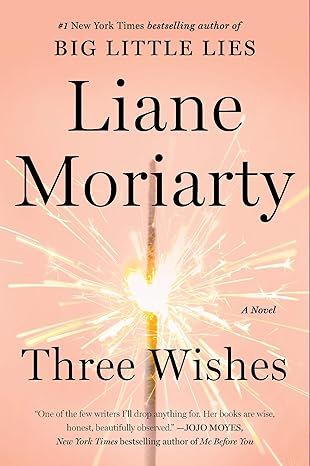
Three Wishes: A Novel
4.2
-
47,880
$9.99
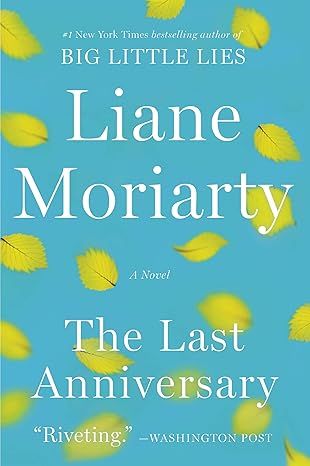
The Last Anniversary: A Novel
4.1
-
57,289
$1.42
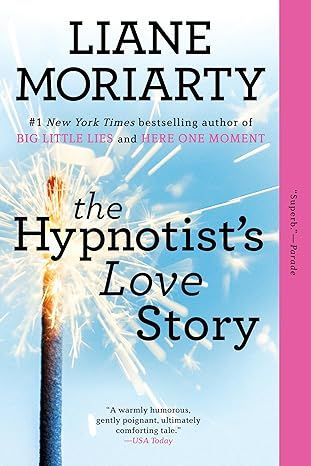
The Hypnotist's Love Story
4.1
-
32,350
$9.69

Nine Perfect Strangers
4
-
59,702
$9.00
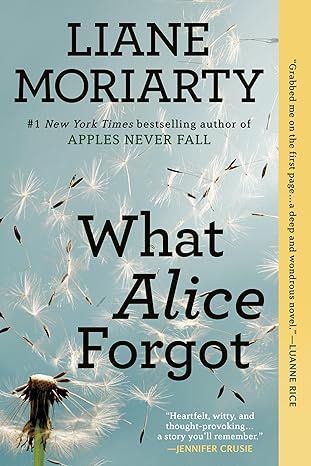
What Alice Forgot
4.3
-
85,708
$3.88
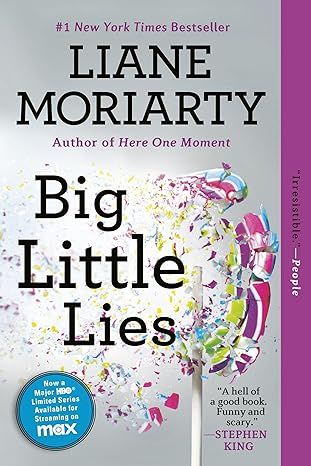
Big Little Lies
4.4
-
160,229
$9.99
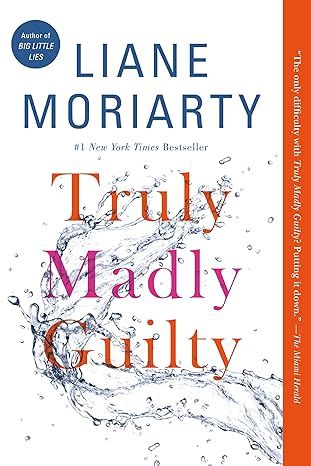
Truly Madly Guilty
3.9
-
64,343
$10.51
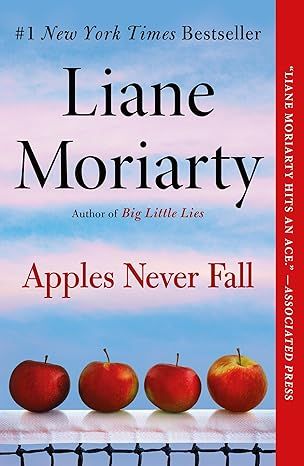
Apples Never Fall
4.2
-
85,144
$6.99
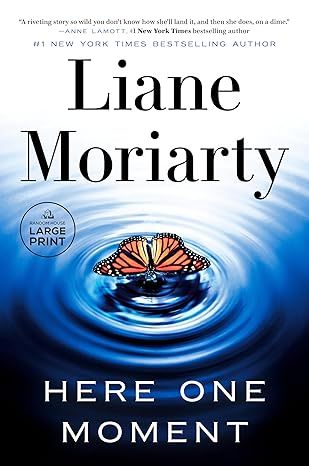
Here One Moment
4.4
-
2,581
$14.99
Similar Books
Best sellers
View all
The Tuscan Child
4.2
-
100,022
$8.39

The Thursday Murder Club: A Novel (A Thursday Murder Club Mystery)
4.3
-
155,575
$6.33

Sapiens: A Brief History of Humankind
4.6
-
140,302
$13.49

The Butterfly Garden (The Collector, 1)
4.3
-
88,556
$9.59

Things We Hide from the Light (Knockemout Series, 2)
4.4
-
94,890
$11.66

The Last Thing He Told Me: A Novel
4.3
-
154,085
$2.99

The Perfect Marriage: A Completely Gripping Psychological Suspense
4.3
-
143,196
$9.47

The Coworker
4.1
-
80,003
$13.48

First Lie Wins: A Novel (Random House Large Print)
4.3
-
54,062
$14.99

Mile High (Windy City Series Book 1)
4.4
-
59,745
$16.19

Layla
4.2
-
107,613
$8.99

The Locked Door
4.4
-
94,673
$8.53
